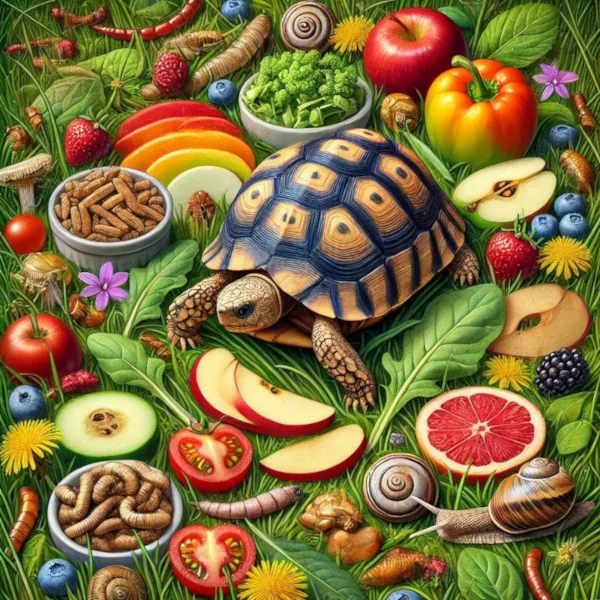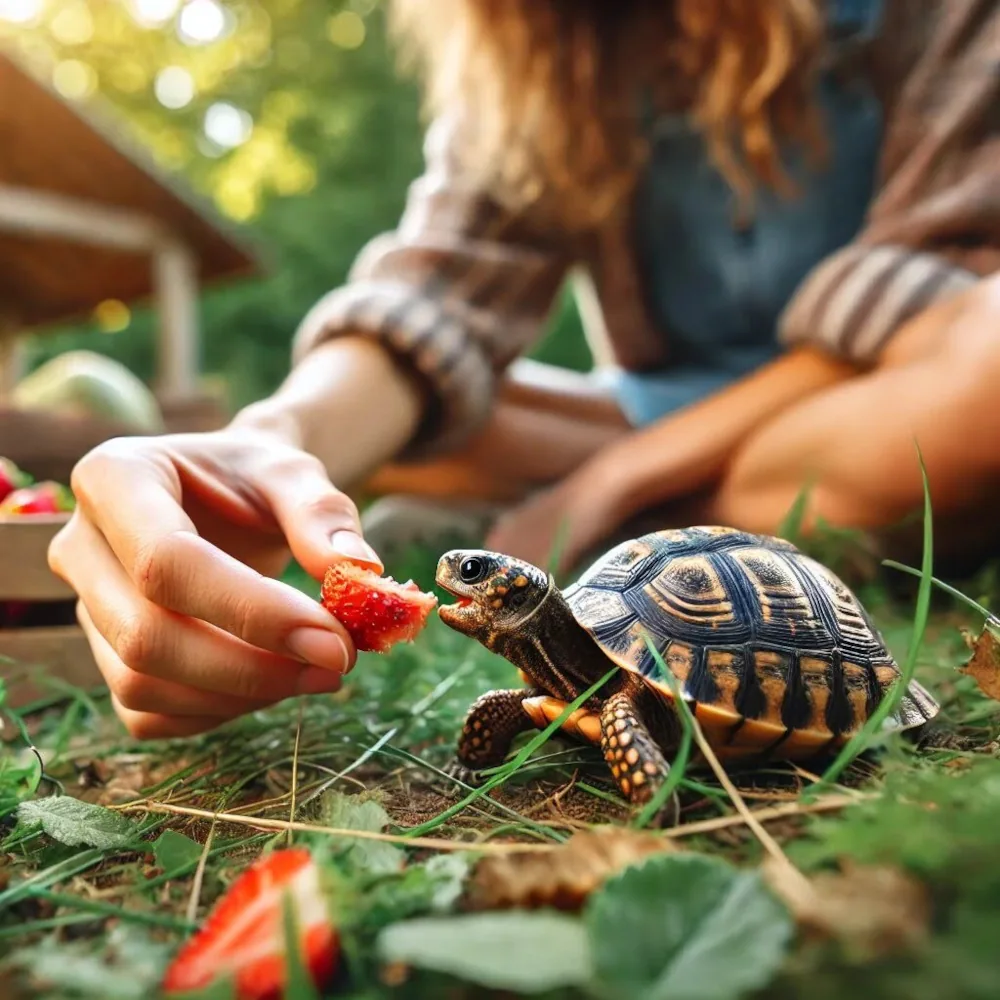What Do Box Turtles Eat?

On a good sunny day by fate if you have ever crossed a path with a box turtle slowly making its way through a garden or a forest without disturbing anyone.
You may have wondered what these fascinating cute little creatures eat.
Because box turtles with their adorable dom shaped shells and cute little eyes are not just captivating to look at. They are also surprisingly very picky eaters.
Preferring to chow down on what they love the most.
So whether you prefer to own a turtle as a pet or are just simply a nature enthusiast.
Understanding what these little creatures eat is very helpful in safeguarding their health and survival.
Come and let’s dive into this world of world of box turtle’s diet blending science with practical tips and some fun facts along the way.
Why Understanding A Box Turtles Diet Matters a Lot
Before we dive deeper into the nitty gritty of things first you need to understand why understanding their diet is so crucial.
You need to understand that box turtles are omnivores which means that they can eat both plants and meat. What they eat helps these little beings to grow up strong and have a nice everyday life.
Just like when you go to the market store to purchase different kinds of food for yourself.
Box turtles also adapt and choose what’s available seasonally in their natural hunting grounds.
As pet owners you also need to replicate that natural environment for your little friends so they can feel comfortable, eat properly and above all be happy.
So What Does A Box Turtles Eat in The Wild?
Well you might find it very surprising but they are nature’s opportunistic eaters. Their diet changes when seasons change and above all what’s available in their surroundings.
And here’s what you will typically find on their menu.
- Insect and Proteins Sources
Protein is king for box turtles especially for the younger ones and during their breeding seasons.
- Wild box turtles commonly feed on:
- Earthworms
- Slug and Snails
- Beetles and Caterpillars
- Grasshoppers and Spiders
These little critters are packed with rich proteins that help them grow normally and strengthen their defensive shells.
- Fruits
While box turtles love sweet treats. It is really necessary to know that fruits should make up a smaller portion of their meal times due to their high sugar content.
In the wild they can eat:
- Berries like Strawberries, Raspberries and Blackberries
- Apples without their seeds
- Melons
- Grapes
Fruits can provide a lot of hydration and other vitamin benefits but if consumed in a bigger quantity they can cause health issues.
- Vegetables and Greens
These green friends often make up a significant portion of an adult box turtle’s diet. So they often munch on:
- Dandelion, Collard Plants and Mustard Vegetables
- Squash
- Carrots if shredded makes it more easier to eat.
- Green Beans
All of these can provide the necessary vitamins, minerals and a dietary balance.
- Fungi and Mushrooms
Very interestingly box turtles can also eat certain types of mushrooms that are harmful to humans.
But be careful when choosing for your pet and don’t give them these fungi as it can be hard to identify which are safe for them.
What Kind of Food Should You Give to a Pet Box Turtle?

After finally deciding with a clear mind that you want to have a box turtle. Make sure that they are being handled and cared for in a very responsible manner.
Also try to copy their natural wild diet as closely as possible to avoid any health problems.
Here are a few ways to give them a balanced diet of protein, vegetables and fruits.
- Ideally:
- 50% protein which includes insects, worms and lean meats.
- 30% vegetables like leafy greens and squash etc.
- 20% fruits like berries, melons and apples.
- Safe Protein Options:
- Earthworms, mealworms and crickets which you can easily get at a pet store.
- Cooked chicken meat.
- High quality box turtle pre-prepared packet meals are also found at pet stores and other shops.
- Vegetables You Can Give:
- Romaine lettuce please avoid the iceberg ones as they are low on nutritional value.
- Dandelions and mustard greens.
- Zucchini and bell peppers.
- Fruits to Offer on Occasions:
- Bananas in low moderation.
- Strawberries and blueberries.
- Mango slices.
- Calcium and Vitamin Supplements:
You can give dusting food that has calcium powder but is without any phosphorus a few times a week so that it can help with their natural shell growth.
Plus vitamin D3 supplements are also crucial if your box turtles don’t have any exposure to natural sunlight.
What Not To Feed Your Box Turtle?
Be careful when feeding your little friend because not all food is safe for them.
So here is a list of what to avoid:
- Processed foods: Bread, chips and candy can harm them.
- Dairy Products: They can’t digest milk, cheese or butter so don’t give it to them.
- Toxic Plans: Please avoid giving them avocado leaves, tomato leaves and rhubarb.
- Citrus Fruits: Oranges, lemons and limes can really upset their stomachs so avoid them.
Make sure you do your research properly to avoid any harm to these precious animals.
Some Feeding Tips and Best Practices
Feeding your little box turtle isn’t just about what you give it’s also about how you give that matters.
So here are a few key tips to remember when you are taking care of them:
- Copying Their Natural Eating Habits: Scatter their food in their cage or their special zone that you made for them and let them try to find it on their own. Keep them active and always eager to explore so they can be playful and healthy.
- Everything Fresh and Clean: Make sure to keep their surroundings neat and remove the leftover food so that it doesn’t rot and any bacteria don’t grow. Keep a hygienic routine around them.
- Hydrate: Give them a fresh water bowl where they can drink and soak themselves in a bath. Replace the water if it becomes dirty.
- Monitoring Their Eating Habits: Try to keep a close eye on your box turtle and make sure they are eating well.
If you see any signs of weakness and notice they aren’t eating their food then take them to a doctor for a checkup.
Do Baby and Adult Box Turtles Eat Differently?
Yes compared to their adult relatives. Baby turtles eat a lot of protein almost 70% which is necessary for their growth.
Insects, worms and other turtle treats are really good for them so make sure they are adequately fed.
And as they gradually grow up into healthy adults their diets will shift to more plant based food. So keep that in mind.
Fun Fact
Box turtles have a really great sense of smell which helps locate any worms or berries deep underground.
Another one is that they can live for 50 years or more and it’s all because of one reason if they are well cared for and loved.
Final Thoughts
So at the end of the day feeding a box turtle isn’t just simply about tossing a few green leaves and calling it a day.
These curious little creatures love a well balanced diet that gives them the energy to shine in a natural habitat.
So whether you are just observing them outside or caring for them at home providing the right type of food is crucial for their long term survival.
Remember a well fed box turtle is a thriving turtle.
